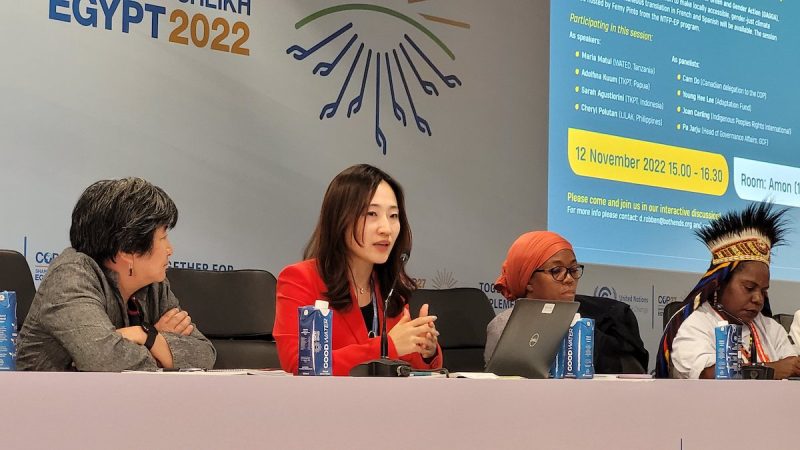This article was originally written and published by GAGGA.
Indigenous and feminist voices called for climate finance to be accessible, inclusive and gender just at GAGGA’s COP 27 side event, co organized by NTFP-EP and GAGGA.
The event “Local perspectives to make gender-just climate finance a reality” counted with the presence of key climate finance stakeholders who discussed the current state of affairs related to the lack of resources reaching gender-just climate solutions in place world-wide.
The session hosted by Femy Pinto (NTFP-EP) was initiated with an intervention by Dolfina Kuum, Indigenous woman, mother, and environmental defender who narrated the crude experience of women in Komunitas Peduli Lingkungan Timika, West Papua who risk their lives everyday in the defense of their land against the mining industry.
The narration set the tone for a discussion among speakers and panelists regarding how inadequate climate action policies and lack of proper implementation put local communities at risk, directly impacting their quality of lives and increasing their vulnerability to the climate crisis effects.
“Where do indigenous women and girls go when projects supposedly funded to save the future of the planet are in fact destroying their present planet?”
Cheryl Polutan (Lilak Purple Action for Indigenous Women’s Rights)
The session threw a spotlight on how un-effective current climate finance mechanisms really are at reaching the local level and how can a feminist perspective be achieved and maintained during the design, funding, implementation and grievance mechanisms of climate action projects.
“Resources are either not available, or not transparent or there is no accountability”.
Maria Matui (WATED Tanzania)
“There needs to be flexibility from donors, funds need to be culturally appropriate and culturally sensitive otherwise we discriminate on women who already are discriminated against: they have no access to education, do not speak official languages. How can they prepare proposals?“
Joan Carling (Indigenous Peoples Rights International)
The full list of speakers and panelists was as follows:
Speakers:
- Maria Matui (WATED Tanzania)
- Dolfina Kuum (Komunitas Peduli Lingkungan Timika., West Papua)
- Sarah Agustiorini (TKPT Indonesia)
- Cheryl Polutan (Lilak Purple Action for Indigenous Women’s Rights)
Panelists:
- Cam Do (Canadian delegation to the COP)
- Young Hee Lee (Adaptation Fund)
- Pa Ousman Jarju (Green Climate Fund)
- Joan Carling (Indigenous Peoples Rights International)
These are some interesting highlights:
“There is no question: we are facing multiple crises today. Climate change is impacting the livelihood of communities. What we are trying to do is to leverage the knowledge of multiple community organizations to push forward the localization agenda. We want to amplify their voices and sit them on the decision-making tables” – Cam Do (Canadian delegation to the COP)
“Allocation of finance should follow a non discriminatory approach and insure that those that have the least will have the most access. The major problem now is the access to finance especially by women in grass root organizations. – Joan Carling (Indigenous Peoples Rights International)
“Gender just climate finance means we have to provide adequate finance for gender responsive adaptation measures, but also promote the leadership and participation of women in the decision making process. We need to address root causes and barriers to gender equality. – Young Hee Lee (Adaptation Fund)
Watch the full event recording here.




